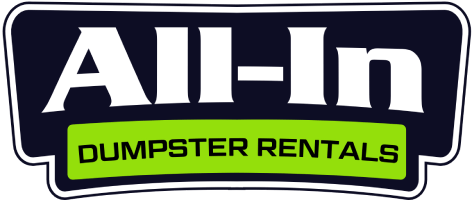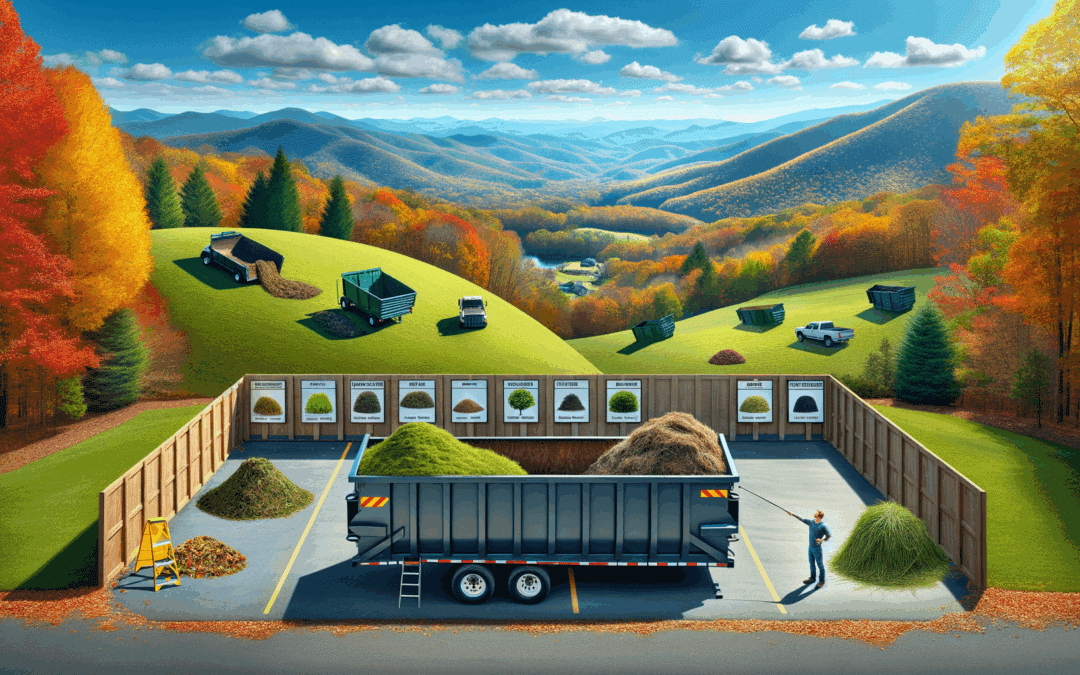When the Blue Ridge Mountains burst into vibrant colors and Western North Carolina homeowners start planning their landscaping projects, one essential consideration often gets overlooked until it’s too late – what to do with all that yard waste. Here in Asheville and surrounding communities like Weaverville, Hendersonville, and Fletcher, our unique mountain terrain and seasonal changes create specific challenges for yard waste removal. As the local experts at All-In Dumpster Rentals, we’ve helped countless neighbors transform their outdoor spaces without the headache of waste management.
Picture this: You’re knee-deep in your landscaping project on a perfect Asheville weekend. The mountain breeze is gently blowing, and you’ve already filled your regular yard waste bin three times over – with piles of debris still scattered across your lawn. This is a familiar scene throughout Buncombe County, where our lush environment produces substantial organic waste during landscaping projects. Unlike flat terrain elsewhere, our mountain properties often yield surprising amounts of debris, from root systems adapted to hillside growth to the abundant natural materials that thrive in our rich soil.
Why Standard Disposal Methods Fall Short for Asheville Landscaping Projects
Before diving into dumpster selection, let’s address why traditional disposal methods often don’t cut it for substantial yard work in our area. Asheville’s municipal yard waste collection is excellent for regular maintenance but quickly becomes overwhelmed by major landscaping initiatives.
Curbside pickup in Buncombe County typically allows only a certain volume of yard waste per collection. When you’re removing overgrown shrubs, reshaping garden beds, or tackling invasive plants that thrive in our climate (kudzu, anyone?), you’ll generate far more waste than standard service can handle.
Making multiple trips to the Buncombe County landfill or transfer station is an option, but consider the time, fuel, and vehicle wear this entails – especially from outlying areas like Candler or Bat Cave. The winding mountain roads make this approach particularly inefficient for large projects.
Many homeowners don’t realize that mixing yard waste with regular household trash is prohibited in most of Western North Carolina. Our region prioritizes environmental responsibility, and proper sorting ensures yard waste can be processed into mulch or compost rather than taking up valuable landfill space.
Types of Yard Waste Common in Asheville Landscaping Projects
Understanding what constitutes yard waste helps determine the appropriate dumpster size. In the Asheville area, landscaping projects typically generate:
Grass clippings and leaves are lightweight but voluminous. Our mountain properties, especially those with extensive wooded areas, can generate surprising quantities during fall cleanup or when reclaiming overgrown areas.
Branches and limbs take up significant space and are common when maintaining properties to reduce wildfire risk – a growing concern in our forested communities. The regular storms that sweep through the Blue Ridge Mountains also create substantial fallen debris.
Root balls and stumps are incredibly dense and heavy. The established vegetation on older Asheville properties often has extensive root systems adapted to our mountain slopes and clay-rich soil.
Soil and rocks frequently need removal during terracing projects, retaining wall installation, or when creating level spaces on sloped properties – a common need throughout Western North Carolina.
Invasive plant removal generates surprising volume, as species like English ivy, bamboo, and multiflora rose thrive in our climate and require comprehensive removal.
Choosing the Right Dumpster Size for Your Asheville Yard Project
Now that we understand the waste types, let’s match them to appropriate dumpster sizes. At All-In Dumpster Rentals, we’ve found these guidelines particularly helpful for Asheville area homeowners:
10-Yard Dumpsters (Approximately 10’L x 8’W x 4’H)
These compact dumpsters are perfect for small to medium landscaping projects in tight spaces – ideal for many of Asheville’s historic neighborhoods with limited access. They work well for projects like:
Single garden bed renovations or small tree removal projects handle these tasks comfortably. The 10-yard size navigates Asheville’s sometimes narrow streets and tight mountain driveways with ease.
Small hardscaping projects generating moderate amounts of soil and old materials find this size adequate. Many West Asheville bungalows and mountain cottages have limited workspace, making this compact option practical.
Seasonal cleanup of a small to medium yard, including leaf removal and brush clearing, fits well in this size. For properties in downtown Asheville or densely developed areas like Montford, this is often the perfect fit.
13-15 Yard Dumpsters (Approximately 12’L x 8’W x 5’H)
These mid-sized options strike an excellent balance for standard residential properties throughout Buncombe County. They’re suitable for:
Whole-yard makeovers for small to medium properties work well with this size. Many homes in areas like Arden or Fletcher with quarter-acre lots find this size just right.
Removal of several large shrubs or a medium-sized tree, including the root ball, fits comfortably. This is common for properties in established neighborhoods undergoing landscape refreshes.
Mixed projects combining hardscaping and plant removal generate varied waste that this size accommodates well. The growing popularity of outdoor living spaces throughout Asheville has made this a frequent project type.
20-Yard Dumpsters (Approximately 20’L x 8’W x 4’H)
For larger properties common in areas like Fairview, Leicester, or rural parts of Henderson County, these dumpsters provide substantial capacity:
Complete landscape overhauls on larger properties generate significant debris that these dumpsters handle effectively. Mountain estates and larger parcels often require this capacity.
Multiple tree removals and major brush clearing projects, especially common after purchasing previously untended mountain property, fill these quickly.
Extensive terracing or slope stabilization projects, a necessity on many Western North Carolina properties, produce heavy soil and rock waste appropriate for this size.
Weight Considerations for Landscaping Dumpsters in Mountain Properties
One crucial factor that’s particularly relevant to our Western North Carolina terrain is weight. Our clay-rich mountain soil is significantly heavier than many people realize.
Wet soil from Asheville’s frequent rainfall can weigh 1,500-2,000 pounds per cubic yard – meaning even a partially filled dumpster can reach weight limits quickly. This is especially true during our rainy seasons, which can saturate materials.
Rock and concrete from hardscaping projects are extremely dense. Many local properties feature natural stone that must be removed during renovations.
Tree stumps and root balls from established trees are surprisingly heavy. Our region’s mature oaks, maples, and other hardwoods develop extensive root systems.
To avoid exceeding weight limits (which can result in additional charges), consider these Asheville-specific tips:
Order a slightly larger dumpster than you think you need if dealing with heavy materials – this allows better weight distribution. For properties in areas with limited access like Chimney Rock or mountain communities, this is particularly important.
Allow soil to dry before loading when possible, taking advantage of our region’s sunny days. Even a day or two of drying can significantly reduce weight.
Consider separating very heavy materials (rocks, concrete) from lighter yard waste if you have the space. This is common practice for larger properties in places like Candler or Marshall.
Seasonal Considerations for Landscaping Dumpsters in Western North Carolina
Our distinct mountain seasons affect both landscaping projects and dumpster needs:
Spring (March-May): Our busy gardening season generates mixed waste as people prepare beds and manage winter damage. Spring in Asheville often brings surprising amounts of storm debris after winter’s toll.
Summer (June-August): Prime time for major landscaping projects, with extended daylight hours allowing more work time. Summer thunderstorms can create unexpected debris, particularly in higher elevation areas around Asheville.
Fall (September-November): Leaf removal dominates, with our famous fall foliage creating substantial volume. The preparation for winter often involves significant cutting back of perennials and shrubs throughout Buncombe County.
Winter (December-February): Though quieter, winter storms can necessitate emergency cleanup, especially in areas prone to ice damage like higher elevations around Weaverville or Black Mountain.
Plan your dumpster rental timing accordingly, as availability can be limited during peak seasons. Spring and fall are particularly busy times for waste management services throughout Western North Carolina.
Environmental Considerations for Yard Waste in Asheville
Our community values environmental responsibility, and proper yard waste handling reflects this ethos:
Western North Carolina emphasizes proper sorting of yard waste to enable composting or mulching rather than landfilling. This aligns with Asheville’s strong sustainability culture.
Some materials are prohibited in standard yard waste dumpsters, including treated lumber, railroad ties, and chemically treated materials. These restrictions protect our local watersheds and environment.
Invasive species like kudzu or Japanese knotweed require special handling to prevent spread. Their removal is encouraged throughout the region but must be done responsibly.
At All-In Dumpster Rentals, we ensure all properly sorted yard waste goes to appropriate processing facilities rather than landfills whenever possible. This commitment to environmental stewardship matches the values of our Asheville community.
Practical Tips for Using Yard Waste Dumpsters in Asheville
Based on our experience serving customers throughout Western North Carolina, here are some practical tips:
Place the dumpster on a firm, level surface – challenging on some mountain properties but essential for safe loading and pickup. Driveway protection is available for sensitive surfaces.
Consider access issues common in our area – narrow roads, steep driveways, low-hanging utility lines, and tree canopies can affect delivery. This is particularly relevant in historic neighborhoods or mountain communities with limited access.
Load strategically – place heavier items on the bottom and distribute weight evenly. This is especially important given the varied materials generated by Asheville landscaping projects.
For properties with significant slopes, ensure the dumpster is secure and won’t shift during loading. Safety is paramount, particularly on the uneven terrain common throughout our region.
Plan for weather – our mountain rain patterns can fill uncovered dumpsters quickly, adding substantial weight. A tarp cover is recommended during our frequent afternoon thunderstorms.
Making Your Final Decision
When selecting the right dumpster for your Asheville area landscaping project:
Estimate your volume needs based on project scope, then size up slightly to account for the typically larger volume of mountain property waste.
Consider the composition of your waste – heavy soil and rocks need different accommodations than light brush and leaves.
Factor in your property’s access constraints, especially common in older Asheville neighborhoods or rural mountain settings.
Remember that yard waste is often bulkier than it first appears, particularly when dealing with root systems and brushy materials common in our region.
With over years of experience serving Western North Carolina, we’ve seen how proper waste management transforms the landscaping experience. The right dumpster turns a potentially overwhelming aspect of your project into a seamless part of your property transformation.
Your garden or yard project should enhance your enjoyment of our beautiful mountain setting – not leave you struggling with debris. By selecting the appropriate dumpster size and following these guidelines, you’re setting yourself up for landscaping success in our unique Asheville environment.
Ready to tackle that landscaping project? We’re here to help with reliable service throughout Buncombe, Henderson, Haywood, and Madison counties. Just like our mountain communities, we believe in being good neighbors and taking care of our shared environment.

